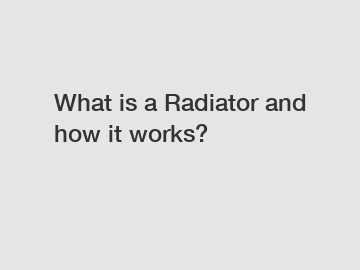Why do Alternators Go Bad?
Mar. 22, 2024
The alternator is a critical component of a vehicle's electrical system. It plays a crucial role in generating electrical power to charge the battery and supply electricity to various components. However, like any other mechanical device, alternators can go bad over time.
Age and Wear and Tear
One of the primary reasons why alternators go bad is simply due to age and wear and tear. Over time, the internal components, such as the rotor, diodes, and voltage regulator, can degrade or fail, leading to reduced performance or total failure. This is especially true for older vehicles or those that have been driven under harsh conditions, such as those used for heavy-duty purposes like trucks. To ensure optimal performance and minimize the risk of alternator failure, it is essential to have regular maintenance and replace the alternator when necessary. If you are in need of a reliable truck alternator supplier, we have a wide selection of high-quality products to meet your needs.
Additional resources:Commercial Vehicle Brake Pad Safety Standards and Regulations
How to choose car springs
What is the Lifespan of a Truck Radiator?
Top 6 Reasons for Uneven Brake Pad Wear
Do You Know The Cost of Repairing Oil Leaks?
How expensive is it to fix an oil leak?
What Is Leaf Spring and How Does It Work?
Electrical Overload
Another significant reason for alternator failure is electrical overload. When there is an excessive demand for electrical power in a vehicle, the alternator can become overwhelmed and fail to keep up. This can happen when there are numerous power-hungry devices operating simultaneously, such as high-powered sound systems, winches, or auxiliary lighting. Additionally, faulty wiring or electrical shorts can cause a surge in power demand that the alternator cannot handle. It is crucial to ensure that your vehicle's electrical system is properly designed to handle the power requirements and that the wiring is in good condition. If you suspect an electrical overload issue or need advice on selecting the right truck alternator for your needs, feel free to contact us.
Faulty Belts or Pulleys
The proper functioning of an alternator relies on a system of belts and pulleys that transfer mechanical power from the engine to the alternator. If these belts or pulleys become worn, damaged, or loose, it can result in decreased performance or failure of the alternator. It is important to regularly inspect and replace worn or damaged belts and ensure the pulleys are properly aligned and tensioned. Ignoring issues with belts or pulleys can place unnecessary stress on the alternator, leading to premature failure. If you need assistance with maintaining your alternator's belt or pulleys or require a replacement, don't hesitate to reach out to us.
What is the leaf spring used for?
Electric car charging stations: Are they necessary?
Are High-End Radiators Worth the Investment?
Are Radiators the Unsung Heroes of Cars?
The Ultimate Guide to Radiator Support Replacement Cost
7 Signs Your Radiator Needs to be Replaced
What Factors Influence Radiator Installation Cost Today?
171
0
0
Related Articles
-
156
0
0
-
172
0
0
-
Revolutionizing Car Cooling: Tongshi Radiator Catalog Which Best Suits Your Ride?
Revolutionizing Car Cooling: Tongshi Radiator Catalog Which Best Suits Your Ride?
151
0
0
-
161
0
0
-
160
0
0
-
216
0
0
-
141
0
0
-
151
0
0










Comments
All Comments (0)